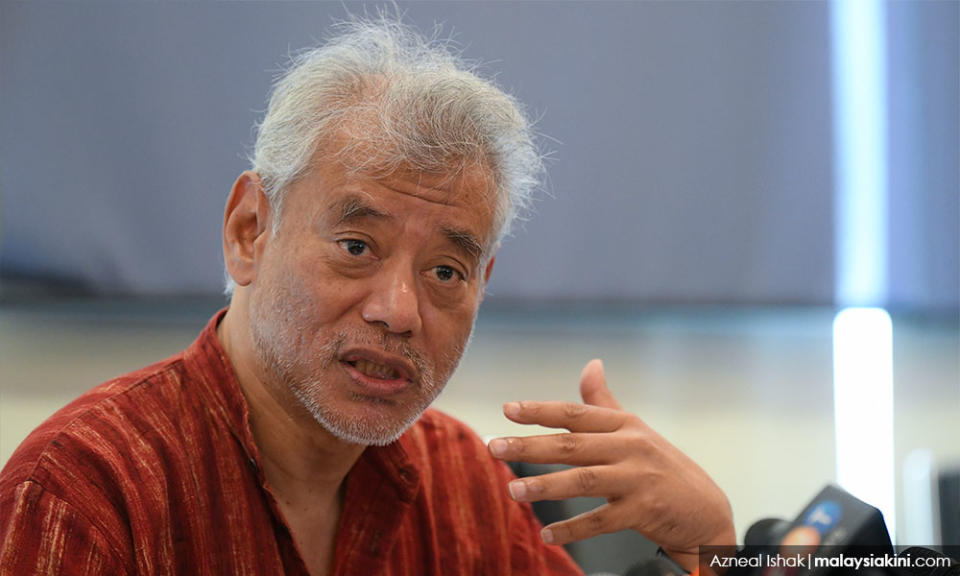Economists raise concern over sale of bumi shares, firms in limited market

Several economists have raised concerns over the safety net measure underlines in the newly released 12th Malaysia Plan which restricts the sales of bumiputera shares and companies only to bumiputera.
Economist Jomo Kwame Sundaram (above) opined that limiting bumiputera share transactions only to bumiputera as mentioned in Prime Minister Ismail Sabri Yaakob’s speech could be a double-edged sword as they would lower the share value.
"Basically, the resale value will go down as a consequence of this measure, which may not be welcomed by many in the group," he said.
More and more bumiputera may resort to buying shares via nominee accounts in order to be able to transact their shares in the open market at higher prices instead of having to only sell to other bumiputera, said Jomo.
"Currently, nominee shares take up to 12.3 percent. The country was promised long ago that the beneficiaries behind these nominees would be published. Instead, their share of presumably Malaysian share ownership has gone up. The public wants to know why they don't want to identify themselves, and the government should also want to know," he said.
Jomo also said bumiputera constitutes about 40 percent of known Malaysian shareholder ownership. This is more than the 30 percent envisaged under the New Economic Policy (NEP) which supposedly ended in 1990.
"The 17.2 percent at par value owned by bumiputera is generally worth much more in terms of actual market prices as shown in various studies because bumiputera agency share ownership dominates the high end as everyone knows.
“Hopefully, this will not be implemented as it will have unintended perverse side effects. The bumiputera will benefit from buying at lower prices but will then resent having to sell at lower prices. Of course, you can introduce all kinds of measures to offset these effects, but they will be costly and bureaucratic.
“In the mid-1970s, a minister introduced a similar measure supposedly to advance bumiputera interests. Subsequent Umno ministers had to revise the law many times to overcome the mess he created, perhaps unintentionally, in pursuit of his own political ambitions then.
“Such measures also make a mockery of Keluarga Malaysia by deepening ethnic segregation, the very apartheid the prime minister condemned in his UN speech. As the government tries to revive the economy by counting on private investors, the arbitrary introduction of ill-conceived schemes will only cause them to doubt,” said Jomo.
Under the 12th Malaysia Plan unveiled by Ismail Sabri yesterday, a new safety net framework, where bumiputera firms and shares can only be sold to bumiputera consortiums, companies or individuals.
For this purpose, a bumiputera prosperity division with a clearer function and mandate will be created by re-assigning officers from every ministry and government agency.
As of 2019, bumiputera shares was only 17.2 percent, with non-bumiputera owning 25 percent while 45.5 percent was held by foreign entities and 12.3 percent were nominee shares.

Meanwhile, Sunway University professor of economics Yeah Kim Leng said the measure will be challenging for stocks as such restrictions limit the market base to broaden its breadth of investors and deepen liquidity in terms of active trading.
"Invariably, such stocks will attract higher risk premiums, rendering them less attractive than comparable stocks that are not dependent on a limited pool of investors.
"If a restricted or closed fund is issued similar to trust funds such as Permodalan Nasional Bhd (PNB) and the objective is to boost share ownership then the idea may be feasible, provided the institution backing it is strong and fail-safe," he said.
Concurring, Shazali Abu Mansor, a senior professor of Faculty of Economics and Business at Universiti Malaysia Sarawak said the measure would be unfair to bumiputera firms and individuals.
"It’s hard to implement the measure as there will be a lot of abuse too. It won’t be fair to the bumiputera individuals who have invested earlier in hopes of getting a better return in their investment," he said.
He agreed that the shares and equities held by bumiputera may end up like the bumiputera housing and property lots which are priced lower due to limited market.
"It's not practical as it would give disadvantage to the respective individual bumiputera. The bumiputera equity will not be attractive. We already have Amanah Saham Nasional Berhad and other institutions that can take care of bumiputera equities," he said.
The government should keep on promoting trust funds like PNB where many bumiputera can participate, he added.
Political analyst Awang Azman Awang Pawi, however, welcomed the measure, which he believed could retain the 17.2 percent bumiputera share.
"From a bumiputera point of view, there is a need for such policy as we know there has been a trend where bumiputera disposed of their equity to non-bumiputera," he said.
"This is good to ensure that the government's goal to achieve 30 percent bumiputera equity is not misused and that there will be no leakage.
"As the largest ethnic group in Malaysia, when hit by poverty, it becomes a huge issue to the country," he said, adding that such measure could boost confidence among the bumiputera.
"The measure, together with others highlighted in the 12th Malaysia Plan, is meant to ensure the Malays and bumiputera continue to support BN, especially Umno, in the upcoming general election," added Awang.

